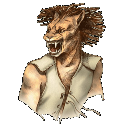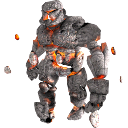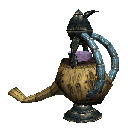
Introduction

Characters

Magic

Religion

Alchemy and
Enchantment

Monsters

Adventures:
Elsweyr (Skooma)

Tools
|
 Characters |
 Magic |
 Religion |
 Alchemy and Enchantment |
 Monsters |
 Adventures: Elsweyr (Skooma) |
 Tools |
I really enjoy the Elder Scrolls games (Morrowind is the best), and I've been described many times as a "lore monkey". So when a few years ago a couple of people in my gaming group convinced me to do some GMing, I got all the GURPS books and set to translating the Elder Scrolls games into the system. The system I've built, I'm going to tentatively call TES:G.
The games* are mostly self-consistent in terms of lore, but the systems do change (climbing was removed for Morrowind, flying was removed for Oblivion, and worse, the most interesting School of Magic was removed for Skyrim). Nevertheless it was quite easy to convert the systems. For the most part, I used the rules and stats for Oblivion, with a little Morrowind thrown in here and there where it was easier (Skyrim wasn't out at the time).
Since then, a few people have asked for the source and notes, so I decided to put the whole lot up here on my website for anybody to peruse. I'd like to point out that I have no connection whatsoever to Steve Jackson's GURPS nor to Bethesda's Elder Scrolls, other than being a tremendous fan of both. This website is ENTIRELY non-official and non-profit, and to the extent that I'm legally able to, I'm releasing everything on this page into the public domain. If any copyright holders would like to discuss this website, please ![]() email me, but I hope you'll support your fans.
email me, but I hope you'll support your fans.
* For some reason, I refer to Bethesda's games as "the games" and mine as "GURPS". Don't know why.
The Elder Scrolls is a series of computer games by Bethesda, the most recent being the incredibly successful Skyrim. They're single-player, first-person-perspective roleplaying games, with an extraordinary amount of freedom - each game has an extensive and elaborate main quest as well as hundreds of detailed and (mostly) well-written side-quests, but you can have a lot of fun even if you just explore independently, never even picking up a single quest after the introduction.
The worlds are enormous and beautiful, and recent games have a very active modding community, supported by some powerful tools released by Bethesda. But what makes them truly great, in my opinion, is the absurdly detailed lore, with extensive historical and geographical background, intricate mythology, and even its own cosmological and philosophical principles.
If you haven't, I highly recommend you play the games (I'd personally suggest starting with TES IV: Oblivion). If you've played a bit already, and are interested in learning more of the lore and backstory, there are three excellent websites:
The Imperial Library (lore and backstory, including the full text of every in-game book);
The Elder Scrolls Wiki (mostly technical gameplay-related information); and
The Unofficial Elder Scrolls Pages (a mix of technical and lore information).
Before we go into the rules and statistics, a quick primer on the system I used, GURPS 4th edition (a great system, not to be confused with the 4th edition of certain other systems which are shite). This assumes that you know at least the basics of what a tabletop roleplaying game is.
Rather than more "traditional" systems, GURPS characters have no class (Heh heh), and there are no levels. Instead it's a point-buy system; you buy stats, skills, abilities, and starting wealth and items using Character Points.
In GURPS, a typical human has basic stats (strength, dexterity, intelligence and health) of 10, and most stats derived from those are 10. Player characters will spend some of their points increasing the basic and derived stats. Note that typical hitpoints are also 10; you can spend points to increase them, but it's a very rare person who has hitpoints above 15.
Skill checks and combat rolls use 3D6 rather than D20. This gives more or less the same range of results, but average results are much more common than either extreme. In my opinion, this is more realistic; most people don't fail at things they're good at five times in twenty!
That should be enough to get you going. For more information, buy the Basic Set from SJGames, or download the free GURPS Lite pdf. I'd also recommend GURPS Magic if you do decide to play TES:G.
TES:G is far from a full-fledged sourcebook, and isn't even especially well-written. Basically it's a few pdfs that I made for my group, with a bit of background text to explain my thinking behind each of them.
Have a look at each of the pages linked at the top of this page. They're in my suggested "chapter order".